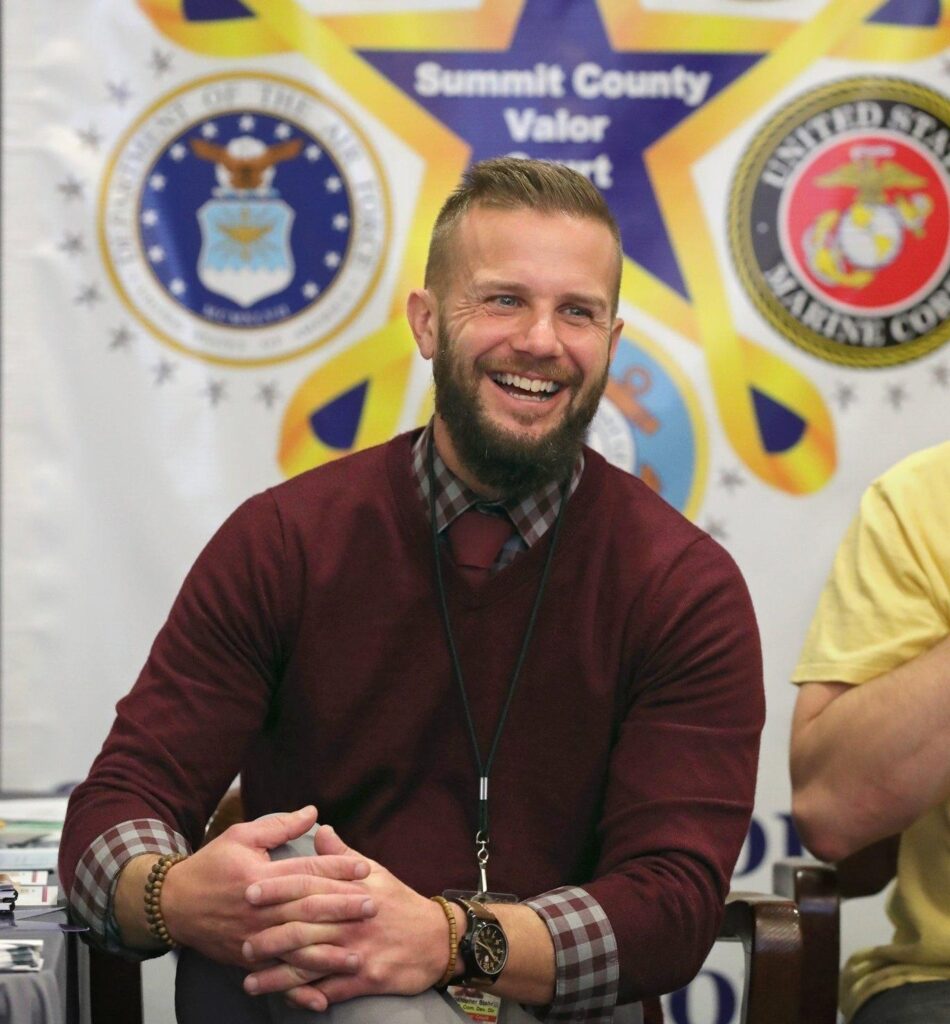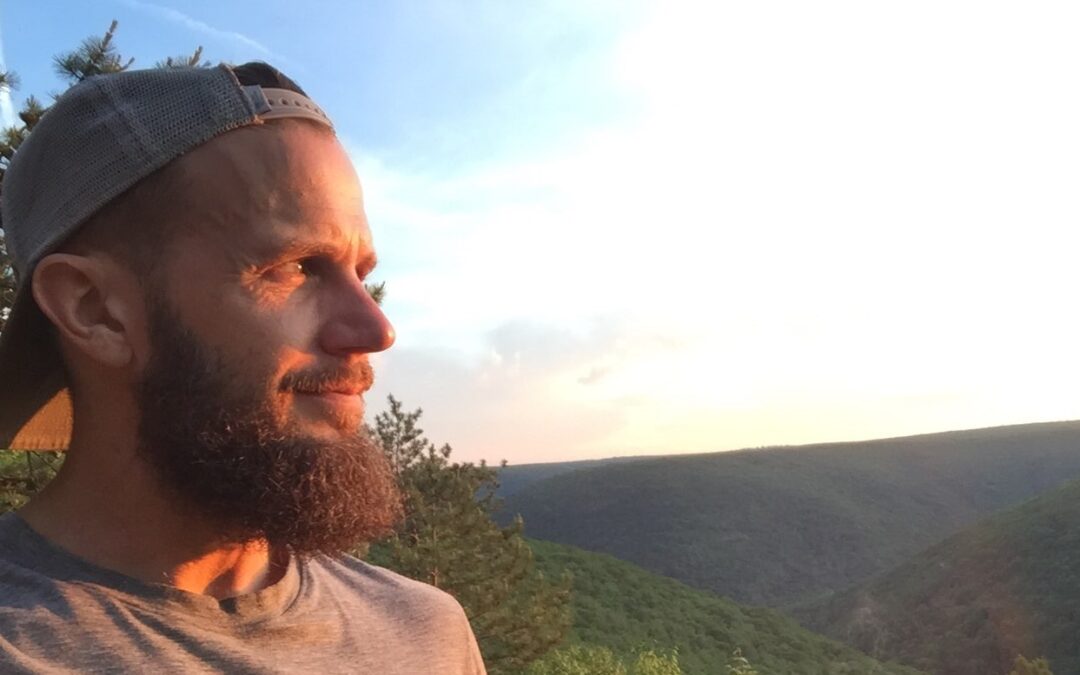Chris Stahr works as the Community Development Director for Summit County’s veteran treatment court program, Valor Court. I’ve gotten to know Chris well over the past couple years. He and his team have helped us learn how to expand resources on relink.org to better serve veterans. In my time working with those in addiction recovery, I have never heard another comeback story quite like that of my dear friend Chris. It has truly inspired me, and I hope it will impact you as well!
Growing up in Akron, Ohio, Chris experienced early emotional trauma. He was born with a condition that caused conductive hearing loss, but this wasn’t discovered until he was older. In elementary school Chris missed a lot of what was going on in class, and was teased by students and teachers alike, planting a seed of self doubt and a desire to escape that would later fuel his path to addiction.
Chris starting drinking alcohol in the 7th grade and was drinking nightly by the time he was a junior in high school. Thankfully he had one thing that kept him temporarily grounded. He had always played sports and excelled as a soccer player, granting him a division 2 scholarship at Ashland University upon graduation. Unfortunately, Chris’ alcohol use and related behaviors got him kicked off the soccer team and eventually out of school.

“It was the first time I was able to see what I was capable of without drinking”
Chris describes addiction as “a progressive disease” because that was how he experienced it. After leaving college, Chris returned home to Akron to find an environment suited to more drinking. When he was only 22 years old he was diagnosed with a severe case of pancreatitis from his alcohol consumption, resulting in extreme pain, multiple hospital stays, and the potential for long term consequences. But he still continued to use, until he enlisted in the army in 2004.
When he arrived at basic training, Chris said “it was the first time I was able to see what I was capable of without drinking” and he was sober for 3 months. Periods of sobriety continued off and on throughout his service, but Chris’ alcoholism became too much and he received an early discharge from service. Soon after, he also experienced an injury and was prescribed Percocet. That, in combination with his PTSD, and moving back to Akron where a stead supply of opioids was available lead him to eventually using heroin.
“It was a reflection of my consequences on their faces.”
In 2008, Chris’ progressive drug use precipitated stealing, which eventually landed him in jail for over 20 felonies. While Chris awaited trial in jail, a deputy asked him to speak to some kids about the consequences of drugs and alcohol. As Chris was telling his story to the kids, he was finally honest and realized the effect his actions had on others. Some of them started tearing up, and he said “it was a reflection of my consequences on their faces”. At that point, facing a potential 20 year sentence, Chris felt hopeless and suicidal, but then he remembered stories he had read in the back of a 12 step book during a stint in treatment at IBH Recovery Center, about people just like him who had found recovery. After that, Chris had hope. He connected to his higher power and started praying for help.

“I am in prison with with 10 years over my head and I am feeling freedom for the first time?”
Chris ended up receiving a 10 year prison sentence. While inside, Chris said he just started applying a principal his sponsor shared with him of “just do the next right thing”. He joined the recovery community, started taking college classes and feeling a sense of freedom. He said he was like “I am in prison with 10 years over my head and I am feeling freedom for the first time? But that is just the reality of it. I felt freer in prison sober than I ever did on the street using and that’s because of recovery.”
Chris’s sentence was reduced to 5 years and in 2016 he was released to participate in Summit County’s Valor Court Program. He also started a job at IBH, the same center where he had been a client. Chris had always wanted to work in a field helping others. He had trained to be a EMT in the army and considered being a flight medic. That wasn’t an option anymore, yet somehow this painful journey of addiction was leading him to a new field where he could help people. He realized all his negative experiences could be used for something positive to relate to and help others in addiction. Chris did so well in Valor Court that the judge brought him back to conduct an aftercare group with fellow veterans. Soon after, he was offered the full time position.

“Everyone always talks about destinations, but it’s the journey, and the journey of recovery is special.”
Today as community development director, Chris supervises Valor Court’s peer mentor program and conducts all the screenings for new participants. In the past few years, since he started working in the recovery field, he has worked with over 400 individuals to help them in their own recovery. Chris is finishing up his Master’s Degree in Clinical Social Work from The Ohio State University and is interning at Catholic Charities in Akron. He also serves on the board of trustees at IBH.
Chris said that the most beautiful thing about being in recovery and working in this field is “watching the miracle happen when someone begins their journey, because that’s part of my journey. Everyone always talks about destinations, but it’s the journey, and the journey of recovery is special.” He said “we don’t help anyone, we help people help themselves and that is powerful in itself, to simply share your experience with someone and then watch the spark take. When you see it, it reminds of you of your experience and provides an overwhelming sense of gratitude.”
Once Chris finishes his degree in clinical social work, he plans to just keep following the path that God has put him on. He wants to continue to work in the field of addiction, create programs, and reduce stigma around addiction. Chris enjoys developing innovative programs. Through his work at the Valor Court he has developed initiatives such as the Arraignment Support and Advocacy or ASAP Program to engage individuals in arraignment with peer support.

As it is for many working in the recovery field, Chris shared the difficulty of losing people to the disease of addiction. He talked about a young client who recently passed of an overdose, and how there is always a question of what you could have done more to help. To practice self care, even with a full time job, going to school, and interning, Chris still makes sure to prioritize his own recovery. He attends 12 step meetings and connects with his higher power regularly though prayer, mediation, and being in nature. It seems that every time I talk with Chris he is planning his next hiking trip! When we spoke for this article he had just gotten back from a 21 mile hiking trip in Virginia.
If you would like to get in touch with Chris to learn more about his work, you can reach out to him at: CStahr@cpcourt.summitoh.net
Did you know that there are many people working in the addiction recovery field that are recovering from addiction themselves? These dedicated and unsung heroes are often working behind the scenes, but on the front lines of the addiction crisis. To honor them and share some of their unique insights, this interview is part of a series. To make sure you don’t miss next week’s article, like and follow us on Facebook today!

About the Author
Bethany Friedrichsen is the Statewide Coordinator for relink.org. She has a background in psychology and has been working for the past three years in the addiction recovery and reentry space to create connections for people in need to the caring resources in their community.


Recent Comments